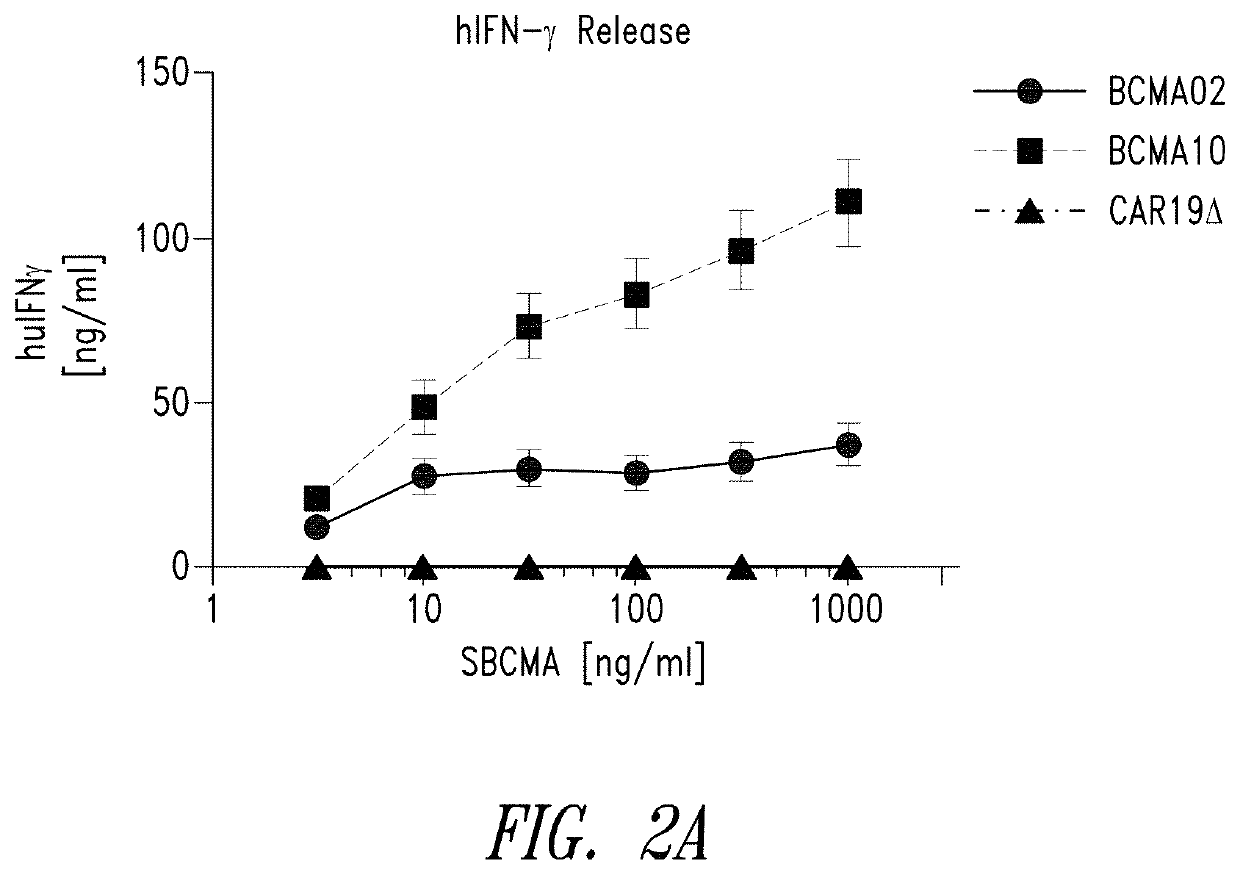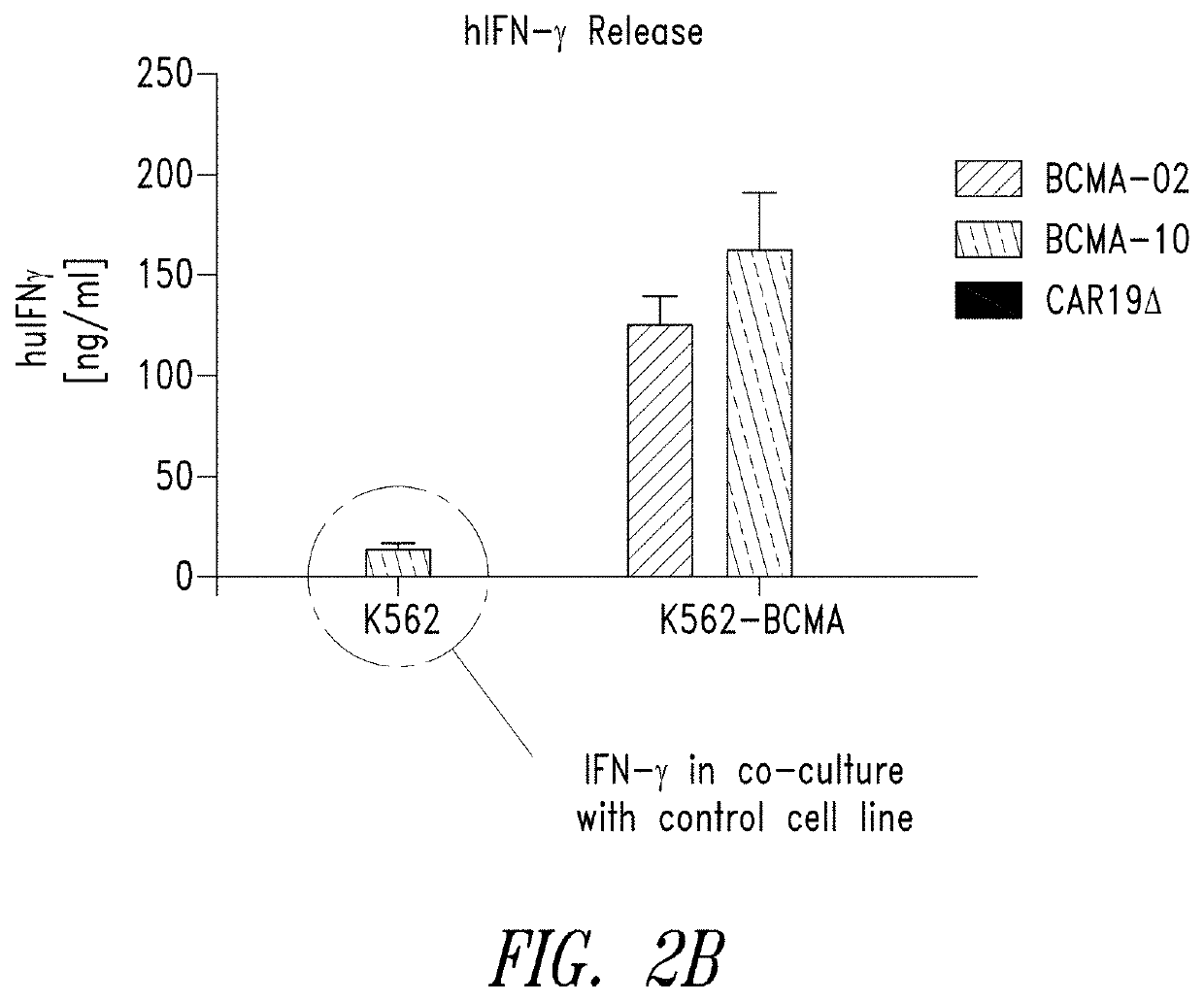Bcma chimeric antigen receptors
a technology of chimeric antigen and receptor, which is applied in the field of improving compositions and methods for treating b cell related conditions, can solve the problems of poor pharmacokinetic profiles, limited utility of traditional methods of treating b cell malignancies, chemotherapy and radiotherapy, etc., and achieve the effect of maintaining the proliferation of transduced immune effector cells
- Summary
- Abstract
- Description
- Claims
- Application Information
AI Technical Summary
Benefits of technology
Problems solved by technology
Method used
Image
Examples
example 1
Construction of BCMA CARs
[0482]CARs containing murine anti-BCMA scFv antibodies were designed to contain an MND promoter operably linked to anti-BMCA scFv, a hinge and transmembrane domain from CD8α and a CD137 co-stimulatory domains followed by the intracellular signaling domain of the CD3ζ chain. See, e.g., FIG. 1. The BCMA CAR shown in FIG. 1 comprises a CD8α signal peptide (SP) sequence for the surface expression on immune effector cells. The polynucleotide sequence of an exemplary BCMA CAR is set forth in SEQ ID NO: 10; an exemplary polypeptide sequences of a BCMA CAR is set forth in SEQ ID NO: 9; and a vector map of an exemplary CAR construct is shown in FIG. 1. Table 3 shows the Identity, Genbank Reference, Source Name and Citation for the various nucleotide segments of an BCMA CAR lentiviral vector.
TABLE 3NucleotidesIdentityGenBank ReferenceSource NameCitation 1-185pUC19 plasmidAccession #L09137.2pUC19New England Biolabsbackbonent 1-185185-222LinkerNot applicableSyntheticNot...
example 2
Evaluation of a Murine BCMA CAR
Introduction
[0483]Adoptive transfer of T cells genetically engineered with chimeric antigen receptors (CAR) has emerged as a promising approach to treat cancers. A CAR is an artificial molecule comprised of an antigen reactive single chain variable fragment (scFv) fused to T cell signaling domains via a transmembrane region. In this example, a CAR molecule specific to B cell maturation antigen (BCMA) was evaluated. BCMA is expressed on multiple myeloma, plasmacytoma, and some lymphomas yet normal expression is limited to plasma cells (Avery et al., 2003; Carpenito et al., 2009; Chiu et al., 2007).
[0484]Anti-BCMA02 CAR was constructed using sequences from a mouse anti-BCMA antibody (C11D5.3). Anti-BCMA10 CAR was constructed using modified sequences and is a “humanized” version of anti-BCMA02 CAR. In a series of in vitro assays, anti-BCMA02 CAR T cells and anti-BCMA10 CART cells both exhibited tumor specificity, high CAR expression, and caused potent rea...
example 3
Minimal BCMA Expression on Lymphomas Activates Anti-BCMA CAR T Cells
[0498]The level of BCMA expression on lymphoma and leukemia cell lines (Daudi and Raji) was measured in order to determine if the expression was sufficient to activate anti-BCMA02 CAR T cells.
[0499]BCMA expression on lymphoma, leukemia, and multiple myeloma cells was quantitated using flow cytometry. In this assay, the relative BCMA expression on the cells was assessed by correlating the fluorescence intensity of BCMA expression to a known number of bound antibodies (antibody binding capacity, ABC). BCMA expression levels in the lymphoma cell lines were compared to BCMA expression levels a multiple myeloma cell line (RPMI-8226) known to activate anti-BCMA02 CAR T cells. 12590±1275 BCMA02 molecules were expressed on the surface of RPMI-8226 cells. By contrast, Daudi cells expressed 1173±234 BCMA02 molecules and JeKo-1 cells (a Mantle cell lymphoma cell line) expressed only 222±138 BCMA02 molecules (FIG. 9, circles).
[...
PUM
 Login to View More
Login to View More Abstract
Description
Claims
Application Information
 Login to View More
Login to View More - R&D
- Intellectual Property
- Life Sciences
- Materials
- Tech Scout
- Unparalleled Data Quality
- Higher Quality Content
- 60% Fewer Hallucinations
Browse by: Latest US Patents, China's latest patents, Technical Efficacy Thesaurus, Application Domain, Technology Topic, Popular Technical Reports.
© 2025 PatSnap. All rights reserved.Legal|Privacy policy|Modern Slavery Act Transparency Statement|Sitemap|About US| Contact US: help@patsnap.com



